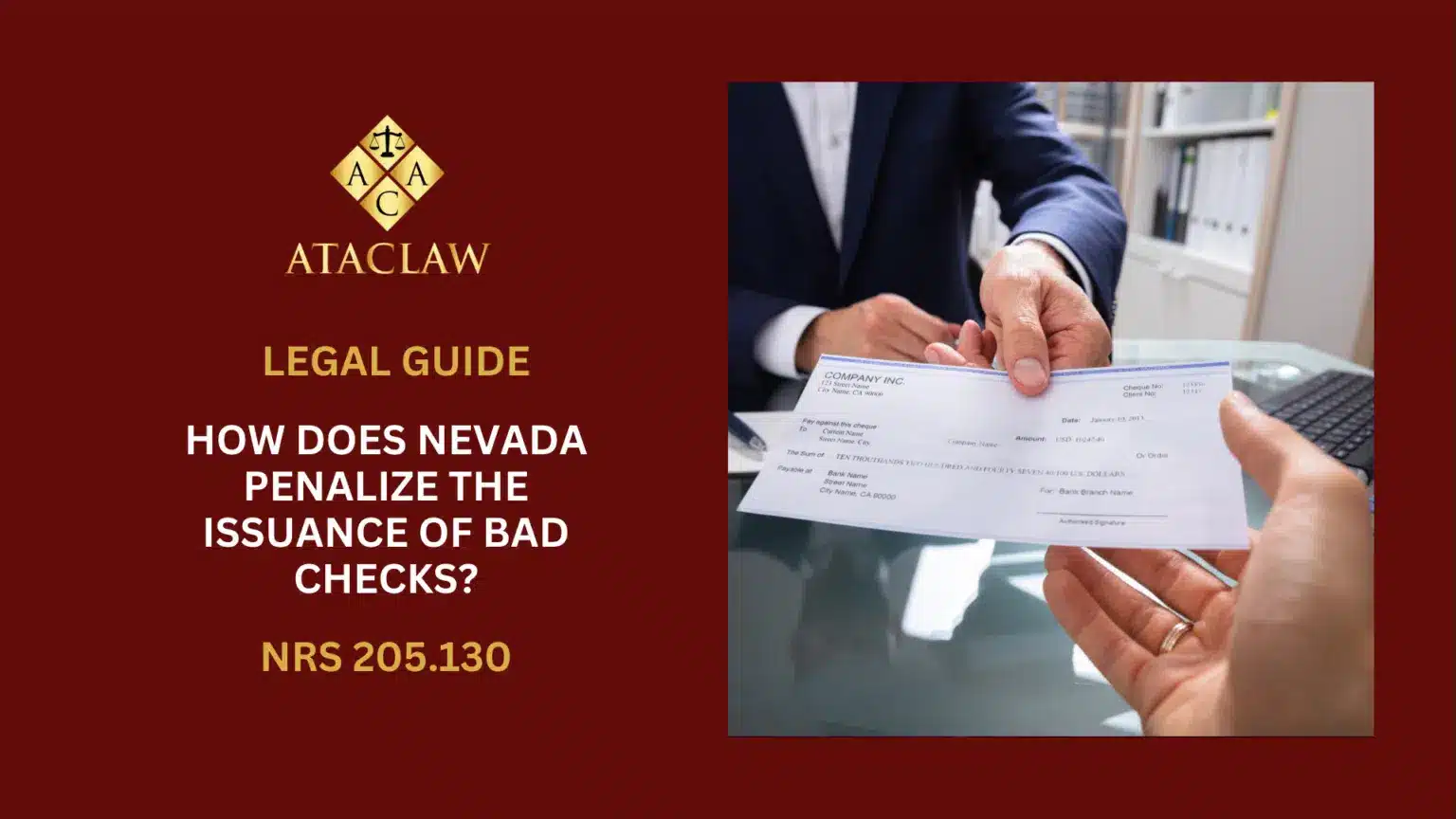Simply put, NRS 205.130 is Nevada’s legal stance against the fraudulent handling of checks. This statute categorizes the passing of a bad check as a misdemeanor when the amount is under $1,200. However, the stakes rise significantly when the amount involved is $1,200 or more, elevating the offense to a felony. This classification signifies Nevada’s determination to combat financial fraud, ensuring that perpetrators face consequences proportional to their actions.
Moreover, it’s crucial to understand that Nevada equates unpaid casino markers to bad checks. This equivalency emphasizes the state’s firm stance on ensuring financial transactions within its bustling casino industry are conducted with integrity and trust.
How Does Nevada Handle Check Fraud Cases?
Check fraud in Nevada involves knowingly writing a check when there are insufficient funds in your bank account. Once a check bounces, there is a legal presumption that you intended to defraud the recipient.
Unlike other offenses where innocence until proven guilty is the norm, check fraud charges come with an assumed culpability. However, there are defenses available that may counteract this presumption.
What Are the Consequences of Committing Check Fraud in Nevada?
In Nevada, the severity of penalties for check fraud largely hinges on the amount of the check involved. Understanding these potential penalties is essential, especially for residents and individuals dealing with financial transactions in the state.
For checks amounting to less than $1,200, the offense is treated as a misdemeanor. This could lead to a punishment of up to six months in jail, fines reaching up to $1,000, or both, depending on the case specifics.
Conversely, if the check value is $1,200 or more, the offense escalates to a Category B felony. Convicted individuals can face one to four years in state prison, be mandated to pay restitution covering the full amount of the check, and possibly incur a discretionary fine of up to $5,000.
It’s noteworthy that Nevada’s District Attorneys often show a willingness to dismiss charges related to bad checks, provided that the accused repays the owed amount. Additionally, there may be opportunities to arrange monthly payment plans to settle the debt, thereby avoiding the full weight of legal consequences.
Facing check fraud charges and understanding your options can be complex. This is where ATAC LAW comes into the picture. We are equipped to provide legal advice and representation to those facing check fraud charges, aiming to secure the best possible outcome by leveraging our knowledge and experience in Nevada’s legal system. Whether it’s negotiating for case dismissal or setting up a repayment plan, ATAC LAW is committed to advocating for our clients’ interests.
Can Check Fraud Lead to Deportation for Non-Citizens?
Committing check fraud, which is considered a crime of moral turpitude due to the intent to defraud, can have severe immigration consequences for non-citizens. Efforts to pass a bad check can lead to being deported.
It’s crucial for non-citizen defendants to consult with an attorney, like those at ATAC LAW, immediately to discuss defense strategies, as achieving a full dismissal of charges under NRS 205.130 may be the only way to prevent facing immigration court proceedings.
Please note that legal processes vary from state to state. If you’re arrested in California, for instance, refer to California’s Penal Code 476a PC for guidance specific to that jurisdiction.
What Defenses Can Be Used Against Bad Check Charges in Nevada?
When facing bad check charges, several potential defenses might be leveraged to challenge the allegations. These defenses are particularly relevant for those in Clark County, including Las Vegas, where the Bad Check Department of the District Attorney’s office actively prosecutes these offenses.
-
- What if I’m a Victim of Identity Theft?
If someone has stolen your identity and written a check in your name, this could be a strong defense. Thieves may also forge signatures to pass checks fraudulently. Proving identity theft involves demonstrating that another person used your personal information unlawfully to write the check. An expert in handwriting may help establish that the signature on the check isn’t yours. If your legal team, such as ATAC LAW, can provide evidence of identity theft, the prosecution may be compelled to dismiss the charges. - What if I Settled the Payment Quickly?
In situations where you’ve addressed a bounced check promptly, making payment within five days after receiving notification, the presumptive intent to defraud is negated. When records confirm quick payment after notification, it’s possible for check fraud charges to be dropped. In the case of casino marker issues, casinos typically allow a 10-day notice period before initiating a criminal complaint, offering an additional opportunity to resolve the matter. - Does Incapacitation Effect Check Fraud Accountability?
Being incapacitated, such as due to hospitalization or illness around the time a check was written, doesn’t automatically exempt you from fraud charges. However, it may weaken the case against you, as it affects the assumed intent to defraud. Evidence of incapacitation provided by your defense—via expertise from a law firm like ATAC LAW—might be useful in negotiating favorable plea terms.
- What if I’m a Victim of Identity Theft?
Is It Possible to Have a Bad Check Conviction Sealed in Nevada?
In Nevada, the ability to seal a criminal record varies depending on the nature of the conviction and its resolution. Here’s what you need to know about sealing records related to bad check offenses:
-
-
- Dismissed Charges: If your charges are dismissed, you can petition to have the record sealed immediately, removing the charges from your public record quickly.
- Convictions: The ability to seal a record for a conviction depends on the severity of the charge:
- Category D Felony: A waiting period of 5 years from the conclusion of the case is required before you can seal the record.
- Gross Misdemeanor: The wait-time to seal the record is 2 years after the case concludes.
- Misdemeanor: For lesser offenses, you need to wait 1 year after the case ends to apply for the record sealing.
-
Knowing where your case falls within these classifications can help you understand the timeline and possibility for sealing your record, ensuring a cleaner slate for future opportunities. For assistance in navigating this process, consulting with a knowledgeable law firm like ATAC LAW can provide you with the guidance and help needed to pursue sealing your record effectively.
For further legal assistance and to discuss your case with an expert, don’t hesitate to contact ATAC LAW.




